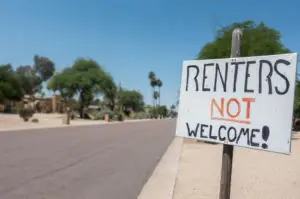
Penal Code 647(e) deals with the act of “squatting,” or “unlawful lodging.” Someone squats on someone else’s property when they live on the property without that person’s permission.
Squatting is considered a misdemeanor-level offense in California. Individuals accused of squatting can face fines and jail time if they are convicted. You can take steps to fight this charge by contacting the Simmrin Law Group. Just call (310) 896-2723 to reach a member of our team.
Squatting or Unlawful Lodging
Penal Code 647(e) is used to prosecute unlawful lodging. According to California, individuals engage in unlawful lodging if they stay in certain areas without the permission of the owner. Individuals can face squatting charges for lodging unlawfully in a:
- Building
- Structure
- Place
- Vehicle
PC 647(e) charges apply if someone squats on either public or private property. Note that the court uses a specific definition for “lodging.” Anyone who stays in the same location over a long term is “lodging” there. However, it can be difficult to identify lodging in specific circumstances. The court can rule that someone is lodging unlawfully if they:
- Set up a tent or another shelter
- Plan to stay in the location overnight
- Set up a sleeping bag or cot
Any of these actions could lead to squatting charges here in Los Angeles.
For a free legal consultation with a lawyer serving California, call (310) 896-2723
Squatting vs. Legal Permission in California
Individuals in California are allowed to lodge on a property as long as they have the owner’s permission. There are many ways in which owners can grant this permission. Note that only a property’s owner or manager can offer permission for lodging. A property owner can offer:
Express Permission
Express permission is clear-cut permission. Here, a property owner says straight up that they allow lodging on their property. They may even put up a sign that says that lodging is permitted. PC 647(e) charges should not apply if an individual has express permission to squat on a property.
Implied Permission
In some cases, property owners grant implied permission for squatting. This occurs if they know that people squat on their property and do not take steps to actively stop lodging from happening. Lodgers here can assume they have implied permission to stay on the property.
Criminal Defense Lawyer Near Me (310) 896-2723
Outcomes of a Conviction for Squatting in California
Squatting is considered a misdemeanor-level offense in California. Misdemeanors are serious criminal charges. A conviction can result in a number of harsh penalties, including:
- Up to $1,000 in fines
- Up to one year in jail
Many individuals who are squatting do so because they are already low on funds. This can make paying the fines associated with a squatting conviction very difficult. You can get more information about the outcomes of a PC 647(e) conviction and how to fight it from the Simmrin Law Group. Just call (310) 896-2723 to find out more.
We can also help you with charges similar to squatting. You can reach out to us if you have questions about:
- Failure to disburse
- Trespassing
- Loitering
Get answers to all of your legal questions right now.
Click to contact our Understanding California’s Penal Code today
Defenses for PC 647(e) Accusations in Los Angeles
A criminal defense lawyer in Los Angeles can step in to help if you are accused of squatting. A law firm can provide you with the help you need to fight back with one of the many defenses that work for squatting charges. For example, we can argue that:
You Were Not Actually Lodging
Merely lingering on someone else’s property is not considered lodging. If you did not plan to stay on the property for an extended period of time, you may be able to avoid a PC 647(e) conviction. However, you may still face charges for loitering.
You Had Permission to Lodge on the Property
Property owners can give individuals permission to lodge on their property. This permission can be either express or implied. You are not committing a criminal act if you stay on someone’s property after they say that you can.
Complete a Free Case Evaluation form now
Speak to a Lawyer About Penal Code 647(e): Squatting Today
You are not alone if you were accused of squatting in California. A member of our team at the Simmrin Law Group can begin working on your case right now. Reach out to our criminal defense lawyers in Los Angeles right now at (310) 896-2723. You can also fill out our online contact form.
Let us help you right now, starting with a free consultation.
Call or text (310) 896-2723 or complete a Free Case Evaluation form
